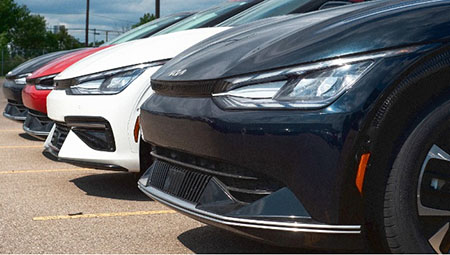by WorldTribune Staff, February 19, 2024
Only a year ago, auto manufacturers were struggling to meet the red hot demand for electric vehicles. In a span of months, though, the dynamic flipped.
By last summer, dealers began warning of unsold EVs clogging their lots. Ford, GM, Volkswagen and others shifted from spending on EVs to delaying or downsizing some projects.
Now, a year later, dealers who were clamoring for new shipments of EVs can’t turn them away fast enough.

What happened?
The push for EVs, led by the progressives who run the Biden Administration, “overlooked an important constituency: the consumer,” the Wall Street Journal noted in a Feb. 14 report.
“This has been a seismic change in the last six months of last year that will rapidly sort out winners and losers in our industry,” said Ford Chief Executive Jim Farley on an earnings call in early February.
In the spring of 2022, Ford said it would expand the Michigan factory where the F-150 Lightning electric truck is built to quadruple the number it could crank out.
Now, Ford said it is cutting the plant’s output by half, and workers are relocating to other facilities, mostly those making gas-powered pickups and SUVs.
The sudden change “was a little bit of a shocker,” said Matthew Schulte, who inspects trucks at the factory in suburban Detroit. “Reality has set in.”
Ford lost a staggering $4.7 billion last year on its battery-powered car business and projects an even bigger loss this year, in the range of $5 billion to $5.5 billion.
Even Tesla Chief Executive Elon Musk warned of “notably lower” growth in vehicle deliveries for the company in 2024.
“Some auto executives acknowledge they got ahead of the market with overzealous demand projections. Pandemic-era supply-chain shocks and a resulting car shortage created long waiting lists and early buzz for EVs, making the industry overly optimistic,” the Journal’s report said. “Only later, as a barrage of new EVs hit the market, did executives realize that car buyers were more discerning than they expected. Many were hesitant to pay a premium for a vehicle that came with compromises.”
The Biden administration had steered the industry toward EVs by earmarking hundreds of billions in subsidies for battery production, consumer tax breaks and EV chargers.
At the start of 2023, auto executives were expecting to cash in on their EV bets.
GM Chief Executive Mary Barra had been among the earliest and most vocal industry advocates of shifting to EVs. The Detroit automaker set a goal of phasing out nearly all gas-engine vehicles by 2035.
“This is a breakout year,” Barra said on GM’s January 2023 earnings call. GM was finally making its own batteries and said it was ready to start cranking out EVs to satisfy pent-up demand for a new electric Cadillac SUV and Hummer pickup truck.
In July 2023, Barra insisted that consumers still wanted the company’s EVs. “These vehicles are getting to the dealers’ lots, and if they’re not already sold, they’ve got a list of people who are waiting for them,” she said.
At the same time, Ford’s Farley struck a different tone. “The paradigm has shifted,” he told analysts. Although consumers were still buying EVs, Ford’s pricing power was deteriorating compared with gas-engine models, he said, and the market for EVs would remain volatile.
Asked what had changed, Farley replied that Ford was responding to market realities.
By October of last year, Barra said on GM’s quarterly call that the transition to EVs was “bumpy,” and said the company wouldn’t meet a self-imposed goal of producing 400,000 EVs over a two-year period through mid-2024.
Soon after, Ford said it would defer $12 billion in electric-vehicle investments and focus on increasing hybrid production, citing the need to better match demand.
“By late last year, it was becoming clear that sales of hybrids—once dismissed by some automakers as an unnecessary half-measure—were taking off and would outsell EVs in 2023,” the Journal reported.
In November, thousands of U.S. dealers signed a letter urging the Biden Administration to ease proposed regulations that would push the industry to sell more battery-powered cars. “Last year, there was a lot of hope and hype about EVs,” the dealers wrote. “But that enthusiasm has stalled.”
Some auto retailers say that they are now selling EVs at a loss to clear unwanted inventory.
“Ultimately, we will follow the customer,” Barra told analysts this month.
Quality Resource for Citizen Journalists
